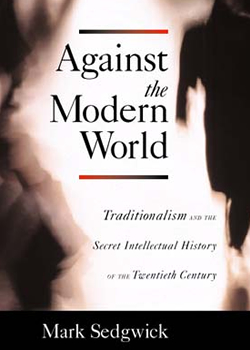|
|
Reviews of Against the Modern World
- History: Review of New Books (Fall 2004), p. 39. Jeff Bloodworth.
- Cahiers du monde russe 47 (December 2005), pp 971-73. Marlene Laruelle.
- Reviews in Religion and Theology 12 (2005), pp. 397-99. Kenneth Wilson.
- American Journal of Islamic Social Sciences 22, no. 2 (Spring 2005), pp. 108-110. Ali Hassan Zaidi.
- H-France Review vol. 6 (April 2006), No. 43. Paul Mazgaj.
- Journal of World History 17, no 2 (2006), pp. 237-39. Colin Beech.
- ARR - idéhistorisk tidsskrift no 1, 2006, pp 114-16. Knut Egil Steffens.
- Aries 6, no. 1 (2006), pp. 98-105. Xavier Accart.
- Esoterica 8 (2006), pp. 186-90. Arthur Versluis.
- Democratiya 7 (December 2006).
Peter Ryley.
- Scholarly reviews forthcoming
- Archives de sciences sociales des religions. Jean-Pierre Laurant
- Journal for Cultural and Religious Theory. Omid Safi.
- Patterns of Prejudice (2007). Andreas Umland.
- Politica Hermetica (2006). Jean-Pierre Laurant.
Media
- United States
- Europe
- " Traditionalism: René Guénon's legacy today - Interview with Mark Sedgwick" Religioscope , June 5, 2004
- " A Core Subject: The Traditionalists' Obsession with the Common Roots of all Religions is Strikingly Resonant Today " by Charles Clover, Financial Times , October 1, 2004.
- " Il tradizionalismo. O la moderna, modernissima anti-Modernità " by PierLuigi Zoccatelli, Il Domenicale , October 2, 2004 (in Italian). Reposted at CESNUR .
- Radio discussion by Dermot Moran and Mark Patrick Hederman, OSB. "Off the Shelf," Pres. Andy O'Mahony. RTE Radio 1, Dublin. March 5, 2005, 6.30 p.m.
- "Fundamentalkritikk av den vestlege verda og hennar verdiar," Knut Egil Steffens, Vestmannen [Bergen] 2, 2006, pp. 14-15 .
- Other
- "Karalevskaya Kampaniya" by Mark Mirski, Novosti Nedeli [Israel], November 2, 2004, p. 28 (in Russian).
Longer comments
-
"Against the Modern World is a genuinely startling
book. In this massively researched and clearly written study, Mark Sedgwick
seeks nothing less than to provide an alternative intellectual history
of the twentieth century. Time and again, he offers unexpected connections,
stresses the importance of forgotten or underestimated thinkers, and
throws new light on the history of esoteric thought and religion. A
wonderful contribution."–Philip Jenkins, author of The Next
Christendom: the Coming of Global Christianity
-
"Mark Sedgwick shows how Traditionalism is a major
influence on religion, politics, even international relations. Famous
scholars, theosophists and masons, Gnostic ascetics and Sufi sheikhs,
jostle with neo-fascists, terrorists and Islamists in their defection
from a secular, materialist West. As a study of esotericism and Western
images of the East, Against the Modern World compares in importance
with Edward Said's monumental Orientalism. Likewise, it deserves the
widest readership."–Nicholas Goodrick-Clarke, author of Black
Sun and The Occult Roots of Nazism
-
“This is an invaluable contribution to an ongoing
and increasingly sophisticated discussion about modernity, the professional
study of religion, and the religions themselves. What sets Sedgwick's
narrative apart from most all previous accounts is his remarkable historical
sweep (from the Italian Renaissance to today), his impressive grasp
of the Muslim world, and, perhaps most of all, the humane grace with
which he treats his historical subjects. Here they emerge with both
their hearts and their warts intact, neither as intellectual fathers
to slay nor as cultural gods to put on the proverbial pedestal, but
as human beings struggling with some of the deepest religious problems
and promises of our modern world. The result is a reading experience
through which one comes to realize, with something of a start, that
their story happens also to be ours.”–Jeffrey J. Kripal,
author of Roads of Excess, Palaces of Wisdom: Eroticism and Reflexivity
in the Study of Mysticism
-
“Une étude très sérieuse,
remarquablement documentée sur certains points, concernant au
premier chef, Guénon, Schuon et les tenants de ce néo-traditionalisme
qu'ils ont inspiré et qui a fleuri entre les deux guerres mondiales
pour s'épanouir dans les années cinquante jusqu'à
nos jours. Le ton est agréable, maniant l'ironie avec à
propos et alternant les analyses de fond avec des récits d'interview
et de rencontres telles qu'un journaliste anglo-saxon pourrait les présenter
à un public lettré.”–Politica Hermetica
|
 |
|
|

